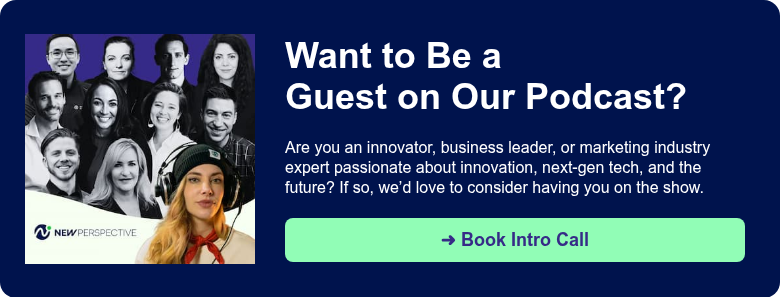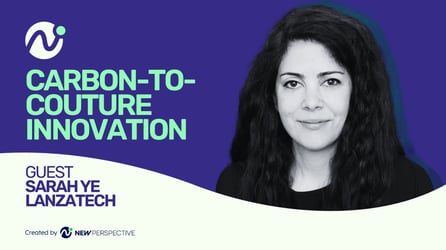Is AI Ready to Manage Land Permits for Renewable Energy?
Episode Info
In this episode of the Green New Perspective Spotlight series, Dunya sits down with Robin Laine, CEO and co-founder of Transect, to discuss how their AI-powered tools are transforming site selection for renewable energy projects.
Robin explains how Transect's software helps developers navigate land risks, assess community sentiment with the Solar Pulse tool, and overcome the challenges of complex permitting processes.
She also shares insights on the importance of human expertise in environmental data and Transect’s latest product updates, including new tools for wind developers.
🎥 Guest: Robin Laine, CEO of Transect Inc
📝 Full episode transcript
Robin 00:00:10 Hi. Nice to be here.
Dunya 00:00:12 Can you tell us a bit more about your background and tell us a bit about the company that you co-founded and are the CEO of?
Robin 00:00:20 So for the last 20 years, about I have been helping infrastructure developers across many different industries, big and small, to understand the environmental and permitting risk on their proposed projects. For the first half of my career, I was an environmental consultant. I started out my career with like hiking boots and snake guards and a backpack full of water, looking for different environmental issues out in the field and then moved up in my career. My last position before I started transect, I was national program manager for a nationwide environmental consulting firm of other kind of field biologists like me, and throughout that part of my career, I just saw a lot of the inefficiencies in the way we were collecting data and the way we were providing recommendations and reporting to our customers, and knew that there was a better way to do things with a lot of the technological advances that we had.
Robin 00:01:15 So eight years ago, I started transect to to use technology to solve a lot of the human centered elements of consulting. And excited to talk with you about it today.
Dunya 00:01:25 Can we talk a bit about what transect does and how do you support renewable energy developers?
Robin 00:01:31 So transect is a software as a service that helps renewable energy developers to find, assess and select the right piece of property to build on. Right now in the renewable space, there's a land race. We need a lot of land about the size of South Dakota, I think, to to meet our country's energy transition goals. And all of the easy sites are taken. So all of the sites that are left over are very complicated to build on. Many of them are very complicated to build on. And so we are trying to help our customers find sites that are high quality and have the least amount of risk. And we do that in three ways. We do that through our environmental and permitting expertise. We also have AI tools, which is what we're here to talk about today for community sentiment.
Robin 00:02:16 There's a lot of local opposition to renewable projects right now. And so we have a tool called our Pulse tool that is helping our renewable developer customers gain insights into how local community might feel about renewable energy projects in their neighborhood. And then we have some grid interconnection and capacity tools as well that are helping to give insights into the interconnection backlog.
Dunya 00:02:39 You mentioned that transit uses AI tools. So how do AI tools help developers understand community sentiment?
Robin 00:02:47 We're using AI as a support tool in our Solar Pulse tool. So what Solar Pulse is doing is helping our customers to gain insights into if a local community might oppose a renewable energy project. And we're doing that through gathering a whole bunch of data, things like local news articles, local contested projects, project velocity moratoriums, code city ordinances and several other sources. And we're running those through an AI sentiment analysis to provide, again, that very quick like stoplight level red, yellow, green assessment on if a local community might be interested in a project like this or might oppose a project like this.
Robin 00:03:28 And this is a really great way to use I it's it's a bit of a kind of a binary prompt for I saying, like, you have all of this data give us kind of a sentiment of what this might mean.
Dunya 00:03:39 You have mentioned limitations of AI. So can you explain more on why AI tools alone are not enough in certain parts of your work?
Robin 00:03:47 So AI is super helpful in a kind of a binary prompt situation. But huge part of our platform is also helping our customers to understand what their environmental and permitting risk is on the land. So are there endangered species? Are there wetlands? Are there local permits that might have a two year long permitting timeline? And for that you really need Expertise. AI works on data, and the reason why our whole platform doesn't work on AI is because of this old, old moniker of like, garbage in, garbage out. Really. Humans need to quality control data. So when you're analyzing news articles and things like that, that's a that's a great resource for AI.
Robin 00:04:30 But when we're trying to analyze if there's an endangered species on a site, the publicly available data is not sufficient for AI to make an analysis. There's a lot of data that's buried in PDF records that's in text form. It's in old scientific papers from the 1970s. And with our environmental consulting experience, we know how to find that kind of information. And what Transact has done is we've actually spent 25 plus million years collating so many different kind of analog sources, not just public data sets into transact. And then we've configured and we have an expert configured rules engine that takes our thousands and thousands and thousands of proprietary data sets, runs it through an expert configured rules engine to provide actionable insights based on our consulting intelligence. And so without the quality controlled data, we really cannot rely on the results of an output. IE is not there enough and it it just doesn't. The the right data does not exist out there in the internet. Even scanning like articles and things like that, it's still not good enough, to really give confidence in decision making in these multi-million dollar projects.
Robin 00:05:41 Part of that is because in order to build the expert configured rules engine, you have to have been a consultant like you need the the human expertise of having actually done wetlands permitting and Nepa permitting in order to shape the rules that drive the assessment and configure that rules engine. And without that, you can even have the best data in the world. But if you don't have the consultants to interpret that data for, like what it means for permitting and timelines and cost, it's still not sufficient to make those critical decisions. And then lastly, it's really important that you have a consultant that can check and interpret the results and provide provide recommendations and based on kind of our expertise and what we know about solar development in the US, and also clarify misinformation. Some of the regulatory documents may say that a permit timeline is 90 days. We know in practicality that's complete and utter crap, and that that permit probably takes 6 to 9 months to get, because that's how that's how the real world works. But if you're relying, if you're relying on AI and it's saying, oh, 90 days, that's how long it'll take your permit, take you to get your permit.
Robin 00:06:47 Like, okay, well then then you're relying on misinformation. And so for all of these reasons, the data collection, the granularity of data that's required, how to configure the the rules engine or the the model to say the right thing requires that expertise. And then on the output, you have to be able to know if something is wrong or not. So for that reason, we use AI for some of our data monitoring and updates, but we don't rely on it for the actual context. because we really it's really important that our, our customers have the human insight as we.
Dunya 00:07:17 Hear a new perspective or a digital marketing agency working with climate tech clients. I have to ask you what marketing strategies have been proven most useful for highlighting transects unique position in the climate tech space?
Robin 00:07:33 so from a marketing perspective, we have a really strong muscle in conferences. We feel like that's a really strong place for us to find leads. I also find a lot of success with LinkedIn and for me personally, I recently started a newsletter on LinkedIn and started a more targeted approach to posting on LinkedIn and getting engagement there.
Robin 00:07:54 I feel like that's a really fun project for me. I'm really enjoying that. I enjoy being on podcasts and kind of, being the ambassador for transect. And so for me personally, that's that's attractive. I've taken and but we're we're having a lot of fun at conferences and webinars, and on LinkedIn as well.
Dunya 00:08:09 Are there any recent news or announcements on transect that you would like to share with our audience?
Robin 00:08:15 Yeah. So we have a couple of really exciting recent product developments. We just launched phase two or version two of our Solar Pulse Product with more and better information in it. And we're actually getting ready to also launch our Wind Pulse product, which is going to help our wind developer customers. Similarly, to understand where there's local community opposition and pushback, we also, over the course of the year, have been launching our interconnection capacity and Q product, and we just announced to our customers yesterday that we have opened up some additional states there as well. So we're very excited about next couple quarters.
Robin 00:08:52 We have a lot more tools coming out for our customers in environmental and permitting, in community sentiment and in interconnection. And it's really it's this is a really fun space to serve.
Dunya 00:09:01 Since the spotlight series of ours is a shorter format for people who want to learn more about Transact or want to get in touch with you. Where can they do that?
Robin 00:09:12 The best place to go is to our website, transect.com, where you can sign up for a demo and I'd be happy to meet with you.
Dunya 00:09:18 Thank you for watching new Perspective Spotlight series. If you like our content, please consider subscribing to our social media channel and follow our podcast on your favorite streaming platform. Thanks.
🕑 Key Takeaways:
━━━━━━━━━━━━━━
➜ Transect helps renewable energy developers find suitable land.
➜ AI tools are used to gauge community sentiment.
➜ Data quality is essential for effective AI analysis.
➜ Conferences and LinkedIn are key marketing strategies.
➜ Recent product launches include updates to Solar Pulse.
➜ Community opposition is a significant challenge for projects.
➜ AI cannot replace the need for human consultants.
📚 Episode resources and links
- 🔗 Web: http://www.transect.com/
- 🔗 LinkedIn: https://www.linkedin.com/company/transect
🎧 Subscribe to our podcast
💬 Follow GNP on Social




